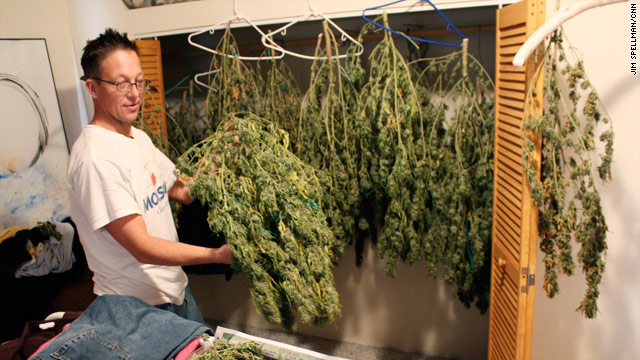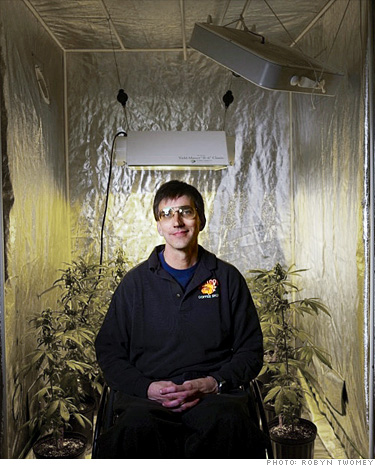CALIFORNIA
Find more videos like this on Chronic Culture
WASHINGTON
Share

 A girl stands in the doorway of a medical marijuana dispensary on Venice Beach in Los Angeles, November 18, 2009. Hundreds of pot shops have sprung up in the last couple of years across Los Angeles, taking advantage of California's medical marijuana laws to do a brisk trade in cannabis offerings branded with names like "Big Buds" and "Super Trainwreck". Picture taken November 18, 2009. REUTERS/Lucy Nicholson
A girl stands in the doorway of a medical marijuana dispensary on Venice Beach in Los Angeles, November 18, 2009. Hundreds of pot shops have sprung up in the last couple of years across Los Angeles, taking advantage of California's medical marijuana laws to do a brisk trade in cannabis offerings branded with names like "Big Buds" and "Super Trainwreck". Picture taken November 18, 2009. REUTERS/Lucy Nicholson

SPEECHLESS
age: 20
location: Denver, Colorado - mile high baby!
country: US
occupation: Boulder Holistic Solutions-A Patient Caregiving Service
Hey there! My name is Brittany and I'm from Denver, Colorado! Once you meet me, you will never forget me, for sure! I'm always at "Mile High" level with "Mile High NORML"- check them out at www.milehighnorml.org. Those of you that live in Denver/Boulder or have visited know that this is THE marijuana capitol of the United States! We even have one of the best radio shows, "Marijuana Radio" please feel free to listen in at www.marijuanaradio.com/news/.
I'm a Sagittarian who loves to smoke and listen to trance music! I also love hanging out with my buds (both kinds!- ha ha). Some of my favorite things to do are spinning lights (check my blog for photos!), meditating, hitting my bong, working out, and chillin' with my chinchilla.
I believe that being Miss Hightimes is more than just smoking all the time... it’s a way to raise awareness for the possibility/potential of legalization of marijuana as well as provide care to patients who need this miracle medicine. I figure if maybe I could touch a few people’s lives by entering Miss.Hightimes, then I already have the best prize of all.
I will be changing my pics and updating my blog periodically so check in and vote whenever you can or whenever you are high... haha!
And my badass friend,
http://misshightimes.com/users/nugghugger
AIM: driftandream25
Add me at: http://www.myspace.com/b_waggin
"I'll support your dreams; When we wake up smiling, It's because they came first"- R.I.P Jake Day




Despite the ongoing political debate regarding the legality of medicinal marijuana, clinical investigations of the therapeutic use of cannabinoids are now more prevalent than at any time in history. A search of the National Library of Medicine's PubMed website quantifies this fact. A keyword search using the terms "cannabis, 1996" (the year California voters became the first of 13 states to allow for the drug’s medical use under state law) reveals just 258 scientific journal articles published on the subject during that year. Perform this same search for the year 2008, and one will find over 2,100 published scientific studies.
While much of the renewed interest in cannabinoid therapeutics is a result of the discovery of the endocannabinoid regulatory system, some of this increased attention is also due to the growing body of testimonials from medicinal cannabis patients and their physicians. Nevertheless, despite this influx of anecdotal reports, much of the modern investigation of medicinal cannabis remains limited to preclinical (animal) studies of individual cannabinoids (e.g. THC or cannabidiol) and/or synthetic cannabinoid agonists (e.g., dronabinol or WIN 55,212-2) rather than clinical trial investigations involving whole plant material. Predictably, because of the US government's strong public policy stance against any use of cannabis, the bulk of this modern cannabinoid research is taking place outside the United States.
As clinical research into the therapeutic value of cannabinoids has proliferated – there are now more than 17,000 published papers in the scientific literature analyzing marijuana and its constituents — so too has investigators' understanding of cannabis' remarkable capability to combat disease. Whereas researchers in the 1970s, 80s, and 90s primarily assessed cannabis' ability to temporarily alleviate various disease symptoms — such as the nausea associated with cancer chemotherapy — scientists today are exploring the potential role of cannabinoids to modify disease.
Of particular interest, scientists are investigating cannabinoids' capacity to moderate autoimmune disorders such as multiple sclerosis, rheumatoid arthritis, and inflammatory bowel disease, as well as their role in the treatment of neurological disorders such as Alzheimer's disease and amyotrophic lateral sclerosis (a.k.a. Lou Gehrig's disease.)
Investigators are also studying the anti-cancer activities of cannabis, as a growing body of preclinical and clinical data concludes that cannabinoids can reduce the spread of specific cancer cells via apoptosis (programmed cell death) and by the inhibition of angiogenesis (the formation of new blood vessels). Arguably, these latter trends represent far broader and more significant applications for cannabinoid therapeutics than researchers could have imagined some thirty or even twenty years ago.
THE SAFETY PROFILE OF MEDICAL CANNABIS
Cannabinoids have a remarkable safety record, particularly when compared to other therapeutically active substances. Most significantly, the consumption of marijuana – regardless of quantity or potency -- cannot induce a fatal overdose. According to a 1995 review prepared for the World Health Organization, “There are no recorded cases of overdose fatalities attributed to cannabis, and the estimated lethal dose for humans extrapolated from animal studies is so high that it cannot be achieved by … users.”
In 2008, investigators at McGill University Health Centre and McGill University in Montreal and the University of British Columbia in Vancouver reviewed 23 clinical investigations of medicinal cannabinoid drugs (typically oral THC or liquid cannabis extracts) and eight observational studies conducted between 1966 and 2007. Investigators "did not find a higher incidence rate of serious adverse events associated with medical cannabinoid use" compared to non-using controls over these three decades.
That said, cannabis should not necessarily be viewed as a ‘harmless’ substance. Its active constituents may produce a variety of physiological and euphoric effects. As a result, there may be some populations that are susceptible to increased risks from the use of cannabis, such as adolescents, pregnant or nursing mothers, and patients who have a family history of mental illness. Patients with Hepatitis C, decreased lung function (such as chronic obstructive pulmonary disease), or who have a history of heart disease or stroke may also be at a greater risk of experiencing adverse side effects from marijuana. As with any medication, patients should consult thoroughly with their physician before deciding whether the medicinal use of cannabis is safe and appropriate.
HOW TO USE THIS REPORT
As states continue to approve legislation enabling the physician-supervised use of medicinal marijuana, more patients with varying disease types are exploring the use of therapeutic cannabis. Many of these patients and their physicians are now discussing this issue for the first time, and are seeking guidance on whether the therapeutic use of cannabis may or may not be advisable. This report seeks to provide this guidance by summarizing the most recently published scientific research (2000-2009) on the therapeutic use of cannabis and cannabinoids for 19 clinical indications:
* Alzheimer's disease
* Amyotrophic lateral sclerosis
* Chronic Pain
* Diabetes mellitus
* Dystonia
* Fibromyalgia
* Gastrointestinal disorders
* Gliomas
* Hepatitis C
* Human Immunodeficiency Virus
* Hypertension
* Incontinence
* Methicillin-resistant Staphyloccus aureus (MRSA)
* Multiple sclerosis
* Osteoporosis
* Pruritus
* Rheumatoid arthritis
* Sleep apnea
* Tourette's syndrome
In some of these cases, modern science is now affirming longtime anecdotal reports of medicinal cannabis users (e.g., the use of cannabis to alleviate GI disorders). In other cases, this research is highlighting entirely new potential clinical utilities for cannabinoids (e.g., the use of cannabinoids to modify the progression of diabetes.)
The conditions profiled in this report were chosen because patients frequently inquire about the therapeutic use of cannabis to treat these disorders. In addition, many of the indications included in this report may be moderated by cannabis therapy. In several cases, preclinical data and clinical indicates that cannabinoids may halt the progression of these diseases in a more efficacious manner than available pharmaceuticals. In virtually all cases, this report is the most thorough and comprehensive review of the recent scientific literature regarding the therapeutic use of cannabis and cannabinoids.
For patients and their physicians, let this report serve as a primer for those who are considering using or recommending medicinal cannabis. For others, let this report serve as an introduction to the broad range of emerging clinical applications for cannabis and its various compounds.
Paul Armentano
Deputy Director
NORML | NORML Foundation
Washington, DC
January 15, 2009
* The author would like to acknowledge Drs. Dale Gieringer, Gregory Carter, Steven Karch, and Mitch Earleywine, as well as Bernard Ellis, MPH, NORML interns John Lucy, Christopher Rasmussen, and Rita Bowles, for providing research assistance for this report. The NORML Foundation would also like to acknowledge Dale Gieringer, Paul Kuhn, and Richard Wolfe for their financial contributions toward the publication of this report.
** Important and timely publications such as this are only made possible when concerned citizens become involved with NORML. For more information on joining NORML or making a donation, please visit: http://www.norml.org/join. Tax-deductible donations in support of NORML's public education campaigns should be made payable to the NORML Foundation.
source: Norml.org










